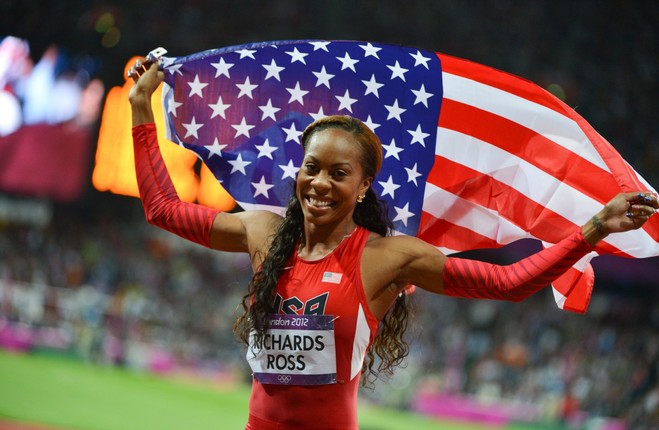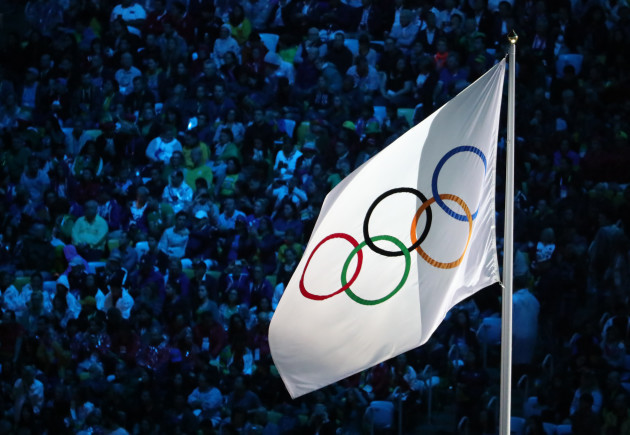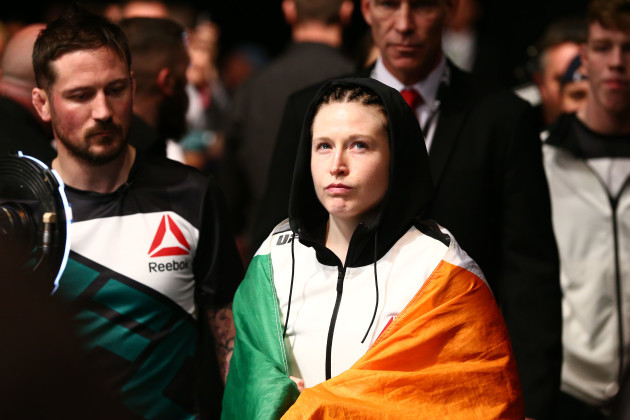WHEN SANYA RICHARDS-Ross recently spoke of her abortion before the 2008 Olympics, she initiated a much-needed conversation about the impact of pregnancy on female athletes.
The four-time Olympic gold medal winner spoke of her experience in her new book Chasing Grace: What the Quarter Mile Has Taught Me about God and Life, in which she talks about agonising over the decision before proceeding with the termination.
“The culmination of a lifetime of work was right before me. In that moment, it seemed like no choice at all.
“The debate of when life begins swirled through my head, and the veil of a child out of wedlock at the prime of my career seemed unbearable.
In a television interview Ross added:
“It’s an issue that’s not really talked about, especially in sports. A lot of women have experienced this.
“I literally don’t know another female track-and-field athlete who hasn’t had an abortion and that’s sad.”
Ross’s story highlights a new extension of the debate about abortion, and poses questions about the extent to which it is affecting female athletes in all sports around the world.
Abortion is currently illegal in Ireland, and there is no definitive data regarding the number of Irish women who may have required an abortion specifically for sports related reasons.
Dr Katie Liston, a senior lecturer in the school of sport at Ulster University, says she is not surprised to hear Ross’s statements.
She also believes it is possible that there may be cases where Irish women have sought an abortion in similar circumstances.
“If you asked (me) if it’s happening in Australia or Europe, I think I would have to say the same thing. Why would Ireland be any different? It’s not going to be any different.
“Sports women are aspiring to achieve what they can. Women are seeking to have control over their own bodies and not to have governments interfere in what they decide to do with their own bodies.
It would be a difficult situation for anyone to be in but I think it would be unrealistic to think it’s not happening.
“This takes you to the heart of who controls women’s bodies and why?”
“There are lots of groups of women who may very deliberately put off thinking about having a family — assuming they’re interested in the first place — until later in their sporting careers. You can see that happening as well.”
She added:
“I’m not shocked by the abortion stuff generally because the stories we hear of women seeking to access services because they feel they need it across the water (in England) because of the legislation (in Ireland).
I’m certainly not surprised because of the focus on high performance and potentially the timing of either wanted or unwanted pregnancies in the athletic cycle.”
“(These are) very personal stories.
“I’m sure those decisions have been taken at different times, undoubtedly and maybe entirely specifically to do with sports for performance? Potentially so, but I would imagine there would also be a little bit of a component about whether or not it would have been accepted within the family environment of particular athletes as well.”
Separately, ‘abortion doping’ is a term that has been linked with women’s sport in the past.
The belief is that pregnant woman can inherit certain health benefits in the early stages of pregnancy that can lead to improvements in their performance levels, and ultimately lead to an unnatural advantage over their opponents.
The range of supposed advantages include a higher production of red blood cells, as well as hormonal changes.
A 2015 article in the Guardian refers to the story of the USSR Olympic team, who allegedly forced some of their athletes to submit to ‘abortion doping’ before the 1968 Games.
“Doctors had discovered that pregnant women could gain an advantage in muscle power, suppleness and lung capacity, because they produced more red blood cells.
“So all the gymnasts, two of whom were 15 at the time, were forced to become pregnant before the Olympics: if they did not have a husband or boyfriend, they were made to have sex with a male coach. Anyone who refused was thrown off the team.
“After 10 weeks of pregnancy every gymnast had an abortion. They won the team gold medal by a fraction of a point, with Czechoslovakia second.”
The suspicions however, were never proven and the team was never found guilty of cheating using this technique. Olga Kovalenko, one of the gymnasts on the team, has since spoken out to vehemently deny the allegations.
There were even reports that another woman attempted to impersonate Kovalenko, and gave a documentary interview in which she confessed to the team’s use of ‘abortion doping.’ The real Kovalenko was reportedly awarded damages for this.
In the recently published book, Under the Lights And In The Dark: Untold Stories Of Women’s Soccer, the author Gwendolyn Oxenham challenges the notion that an athlete can inherit any performance benefits while pregnant.
She writes that “there have been very few concrete studies examining how changes in the body during pregnancy can affect performance.
“With so many variables — how the pregnancy went, how the birth went, whether there was a C-section — it’s difficult to have a controlled study.”
The book also highlights the opinion of the director of the Human Energy Research Laboratory at Michigan State University, who says that “if there’s any physiological advantage, it most likely ends after the first two months.”
Liston points out that ‘abortion doping’ is difficult to detect, as it is not illegal for a woman to get pregnant at any time.
How would you establish that a particular pregnancy was achieved deliberately for the sake of promoting the certain hormones?”
The discussion about the effect of pregnancy on female athletes also incorporates the potential impact of sport on a woman’s fertility levels.
An unhealthy and obsessive approach to performance can cause fertility-related complications for female athletes involved in sports where weight management is a central component.
In an interview with the Irish Times last year, retired UFC fighter Aisling Daly admitted to losing her periods for a time due to a lack of knowledge about safe weight management.
“I was ending up with hormonal imbalances from so much stress on my body. I didn’t know I had all these things wrong with me.
“Even the mentality I had for weight-cutting was a bit old school and it was just train crazy hard and don’t eat. It got really bad, my periods stopped which can do a serious amount of damage.”
Liston believes that female athletes who are conditioned to focus only on the present when it comes to their sporting careers may unintentionally take risks with their bodies that could have consequences later in life.
“I’ve read a lot of the research and this tends to be a lot of the high performance sport. The sports where weight gain is regarded as potentially a weakness rather than a strength.
We haven’t really talked about fertility and women in sport yet. It’s not just the idea of I suppose having a difficult decision to make about a pregnancy at the wrong time, it’s also about the broader issue of women and who they are. If they want to be a mother and the implications of their health going forward, including fertility, particularly in high performance sport.
She added: “The mantra that sport is good for health isn’t as simple as that. High performance sport has potentially negative implications for health, alongside some of the positive benefits that we know about.
“As a society, we also need to talk about those (things) a little bit more because we tend to put the high performance athletes on a pedestal.
“These are the role models of health but the higher up you go in that high performance ladder, the more the paradox is in many ways, the more your body comes under physiological pressures and you’re managing more things.
“You’re managing pain, you’re managing injury, you’re playing through pain and injury, you are risking — depending on your sports and the different long-term injuries — arthritis, osteoporosis further down the line.”
The42 is on Instagram! Tap the button below on your phone to follow us!




